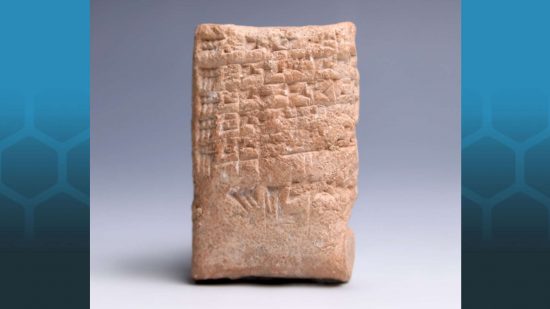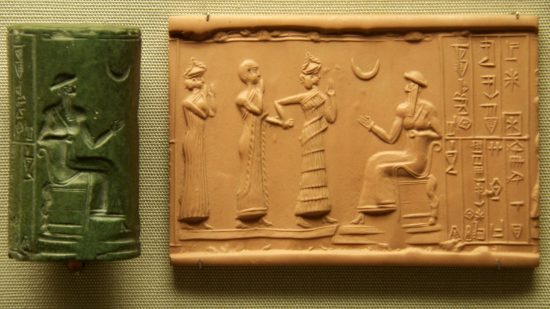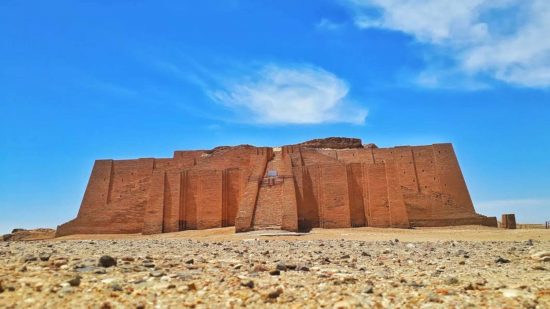03/04/2023 Sorry TCG buffs, this was our April fools prank for 2023. The ancient world did produce many and varied games, but so far, nobody has found a TCG. Lets hope the real archaeologists let us know when they find one!
Academics have discovered the world’s first trading card game, dating from circa 1750 BCE, according to a joint paper from researchers at SOAS University of London, and Mustansiriyah University, Baghdad. 134 clay tablets recovered from ruins of the ancient Sumerian city-state Ur provide researchers a fascinating insight into “The revered game played in the house of the king who lets counsel flourish”, which predates Magic the Gathering by thousands of years.
The ‘cards’ – similar in size to Magic the Gathering Cards, or the Yugioh card size, but 1” / 2.5cm thick, each one weighing 3.5oz / 100g – were produced by priests at several temples, including the ziggurat ‘Elugalgalgasisa’, “house of the king who lets counsel flourish”, from which the game derives its name.
“We can infer from letters and administrative records that they were initially created for religious events and important civic festivals”, says Professor Akilah Hussain Ahmad of Mustansiriyah University. “Each year new tablets with new rules were created, leading to a busy secondary market of players trading their ‘cards’”.
Ahmad describes the objective of the game: “Players adopt the role of petitioners in the court of Nanna” – the moon-god patron of Ur – “Attempting to curry favour by playing cards that gave gifts to members of the divine court, sending courtiers, or besmirching their opponent’s reputation”. Reputation points were tracked using carved silver, gold, or stone cockle shells. Players won when their reputation “rose equal to their ambition”, though archaeologists are still debating what, exactly, this number was.
Cheating was not unheard of, Ahmad says: “To randomise the ‘draw’ of the inch-thick clay tablets, which would be even more cumbersome to shuffle than an MTG Commander deck, they were placed under a cloth and rearranged by the opponent. We have a letter to a court official complaining about the merchant Ea-Nasir, who insisted that his own servant shuffle the tablets on his behalf, producing suspiciously favourable draws.”
“This is the first time we’ve seen a game with so many written elements from the ancient period”, says Professor Joffrey vanHaag of SOAS. “The more famous Royal Game of Ur is a racing board game, and of course abstract games Chess and Go trace back to the royal courts of India and China respectively.” He adds: “This is the first time we’ve seen a game with so much text on the cards. It reminds me of Yu Gi Oh! There really is a lot of text on those clay tablets.”
The collectible element of the game is also unprecedented in the ancient world. Magic the Gathering took the world by storm in 1992, pioneering the collectible card game genre, still regarded as one of the best trading card games to this day. “I’m more of a Flesh and Blood player”, says vanHaag, “I still haven’t forgiven Wizards for what they did to the organised play scene. Similarly, ancient Sumerians didn’t have anything like MtG Arena – games took place in temples, the marketplace, or in the homes of wealthy merchants and nobles”.
The game was so popular that several enterprising Sumerian business people began producing their own, imitation tablets. “We have a partial letter from a senior priest to a royal attendant requesting punishment for the forgers”.
It seems ancient Sumeria took a hard line on proxies. “Nowadays, I couldn’t play in an MTG Modern tournament with proxies”, says Ahmad, “Which is bullshit because a playset of modern staples like Ragavan or Murktide Regent is incredibly expensive, even before you consider the import costs to Iraq. But the punishment for theft of property from Royal Temples in this period of Sumeria was death, and we know of at least one merchant who was executed for selling bootleg cards”.
VanHaag is attempting to organise an exhibition game using the original tablets at the British museum, but for the moment, the tablets will remain in Baghdad. “The tablets are very delicate and we have all the appropriate preservation technology here”, says Ahmad. “Also, VanHaag is a salty little bitch whenever I beat him on MTG Online, and I would absolutely crush him”.
“She’s just paranoid that it’s a ploy for the British Museum to steal the tablets”, says VanHaag. “Which, to be fair, it is”.


